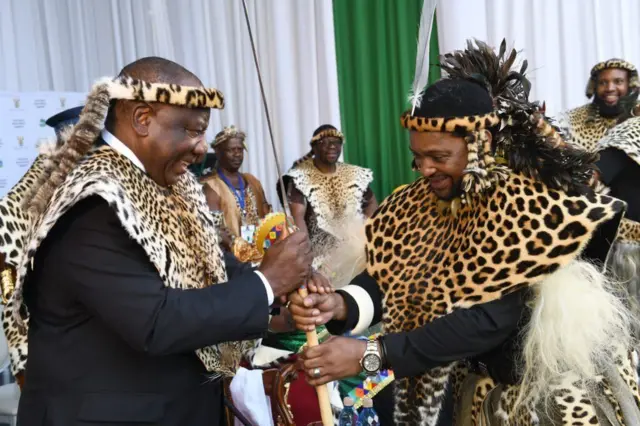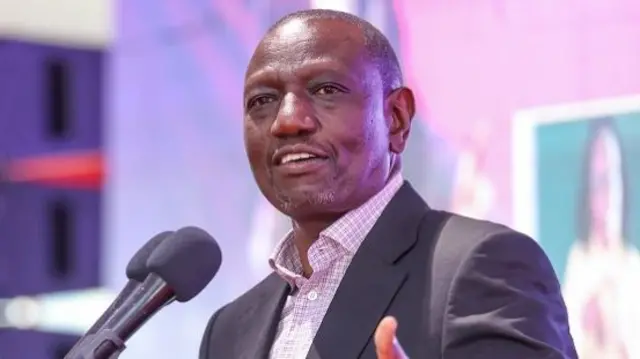What is the UK's plan to send asylum seekers to Rwanda?published at 09:31 BST 13 June 2024
Plans to send some asylum seekers to Rwanda were passed by Parliament, but still face legal challenge.
Read MoreThis is an automated feed overnight and at weekends
Plans to send some asylum seekers to Rwanda were passed by Parliament, but still face legal challenge.
Read MoreBBC Sport recaps the 2023 Africa Cup of Nations after Ivory Coast beat Nigeria in the final to clinch the trophy on home soil.
Read MoreFelix Tshisekedi came to power in 2019 vowing to made DR Congo "the Germany of Africa".
Read MoreFootball club owner Moïse Katumbi is one of the Democratic Republic of Congo's richest men.
Read MoreFor the latest updates, go to bbc.com/africalive
 Thomas Naadi
Thomas Naadi
BBC News
Vote counting is under way in Chad after polls closed on Sunday in a controversial referendum on a new constitution.
Chadian authorities told the BBC that the voter turnout was "satisfactory" but reports suggest that there was a lack of enthusiasm among voters.
The vote is an important step in the transition to constitutional rule next year but it has been widely seen as an attempt by the military-led government to consolidate power.
It comes after more than a year of brutal crackdowns against pro-democracy protesters.
Some opposition parties and civil society organisations had called for a boycott of the referendum, citing a lack of transparency and fairness in the process.
Provisional results are expected to be announced on 24 December, with the Supreme Court due to validate them four days later.
The proposals are widely expected to be adopted, paving the way for general elections late next year.
 Image source, Getty Images
Image source, Getty ImagesUnder South African law, the president gives official recognition to the new king
A faction of South Africa's Zulu royal family has accused President Cyril Ramaphosa of meddling in the family's affairs and fuelling divisions, days after the president said he would appeal against a court decision invalidating his coronation of Zulu King Misuzulu ka Zwelithini.
Prince Thokozani Zulu, a supporter of the king's half-brother Prince Simakade Zulu, on Sunday told local media that President Ramaphosa's conduct had "foiled any possible attempt to engage" with the new king.
He also accused Mr Ramaphosa of taking sides in the family succession feud.
Prince Simakade and King Misuzulu, who was officially crowned king by President Ramaphosa last year, have been battling for the throne since the 2021 death of their father King Goodwill Zwelithini.
The court ruling has reignited tensions between the family factions aligned to the two, despite the judge stressing that his ruling did not determine the rightful king, but whether the president had followed proper procedures before recognising King Misuzulu as the monarch.
Under South African law, the president gives official recognition to the new king, paving the way for him to be treated like a constitutional monarch and to be funded by the government.
 Image source, Kenyan presidency/X
Image source, Kenyan presidency/XPresident William Ruto terms request to arrest DR Congo opposition figures "undemocratic"
Kenyan President William Ruto says he rejected a demand to arrest politicians from the Democratic Republic of Congo who launched an alliance with rebels in Nairobi on Friday.
It was then that Corneille Nangaa, the former head of DR Congo's electoral body, announced in a hotel in the Kenyan capital that he was creating a political-military alliance with M23 rebels and other armed groups with the aim of restoring peace.
Mr Nangaa was flanked by M23 leader Bertrand Bisimwa.
The move sparked an angry response from the Congolese government who warned Kenya of “consequences” for hosting him.
President Ruto, who spoke to Kenyan journalists in an interview on Sunday, said he refused to heed the request to arrest the DR Congo politicians, terming it "undemocratic".
"Kenya is a democracy. We cannot arrest anybody who has issued a statement. We do not arrest people for making statements, we arrest criminals," Mr Ruto added.
On Saturday, the Congolese government summoned the Kenyan ambassador in Kinshasa and also recalled its ambassador to Nairobi for "consultation".
In response, Mr Ruto said it was DR Congo's right to do so, "but I cannot arrest anybody merely because they issued a statement. That is undemocratic, and that is not how Kenya is."
Kenya's foreign ministry earlier said it "strongly disassociates" from DR Congo's internal affairs, adding that it had begun investigating the matter.
DR Congo is gearing up for elections on Wednesday with worsening insecurity in the eastern region, where more than 100 armed groups, including M23, operate.
The former president is seeking to portray himself as the saviour of the governing party by opposing it.
Read MoreUpdates from across the African continent.
Read MoreParamedic Gerco van Deventer was seized in Libya in 2017, and later sold to the militants in Mali.
Read MoreThe stonemasons died while carrying out repairs on the Unesco World Heritage site in Tunisia.
Read MoreAn overcrowded boat is believed to have been swamped by high waves after leaving the city of Zuwara.
Read MoreThe church set up to welcome LGBT worshippers in a country that is growing more homophobic.
Read MoreJohn Yorke takes a look at A Grain of Wheat, Ngũgĩ wa Thiong’o’s groundbreaking book about the lead up to Kenyan Independence. Published in 1966 as part of the Heineman African Writers Series, A Grain of Wheat offers an authentic insight into Kenya’s Land and Freedom Army rebellion (better known in Britain as the Mau Mau) and its brutal suppression by British colonial authorities. Told from the perspective of various Kikuyu characters living in Kenya’s central highlands, it is set in the four days leading up to the hard-won Uhuru, or Independence celebrations. But through flashbacks, we also learn of what has happened in the decade prior to that; how characters have been sent to detention centres, or held in concentration camps, resisted British authorities, or collaborated with them. Now, on the eve of change, it is time for reflections and recriminations.
John Yorke has worked in television and radio for nearly 30 years, and he shares his experience with Radio 4 listeners as he unpacks the themes and impact of the books, plays and stories that are being dramatised on BBC Radio 4. From EastEnders to the Archers, Life on Mars to Shameless, he has been obsessed with telling big popular stories. He has spent years analysing not just how stories work but why they resonate with audiences around the globe and has brought together his experience in his bestselling book Into the Woods. As former Head of Channel Four Drama, Controller of BBC Drama Production and MD of Company Pictures, John has tested his theories during an extensive production career working on some of the world’s most lucrative, widely viewed and critically acclaimed TV drama. As founder of the hugely successful BBC Writers Academy John has trained a generation of screenwriters - his students have had 17 green-lights in the last two years alone.
Contributors: Njambi McGrath, author of Through the Leopard’s Gaze, award-winning comedian and political commentator.
Credits: Abridged readings from A Grain of Wheat by Ngũgĩ wa Thiong’o, published by Penguin Modern Classics in Association with Heinemann African Writers Series. Archive recordings from World Book Club, 9th March 2019, BBC World Service
Readings: Patrick Gatua Researcher: Nina Semple Production Manager: Sarah Wright Sound: Sean Kerwin Producer: Redzi Bernard Executive Producer: Sara Davies
A Pier production for BBC Radio 4
Jacob Zuma says it would be a betrayal to campaign for Cyril Ramaphosa and has launched a new party.
Read MoreA priest remembers how a queer-affirming church in Kenya changed his life and his calling to priesthood.
Read MoreSome 40 million people will vote in a nation the size of Western Europe, home to vast mineral resources.
Read MoreNdinda says her mother smuggled a wedding ring from Nottinghamshire to Kenya by baking it into a cake.
Read MoreAs usual, DR Congo's election period has brought a burst of political music by huge stars.
Read More